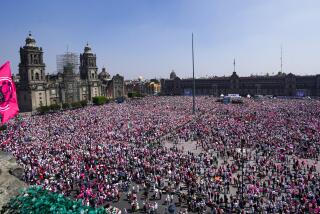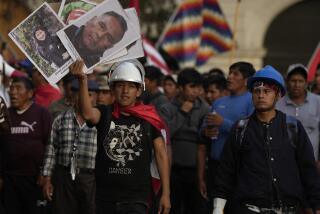20,000 Marchers Demand That Aquino Quit, U.S. Bases Be Shut
- Share via
MANILA — More than 20,000 protesters demanded Wednesday that President Corazon Aquino resign, in a rally that brought together leftists, rightists and former supporters of the Philippine leader.
Speakers charged that Aquino betrayed the “people power revolution” that swept her into office on Feb. 25, 1986.
The largest anti-government rally in years brought together former Aquino Administration officials, leftists and rightist supporters of the late President Ferdinand E. Marcos.
They raised fists as march organizers read a manifesto declaring that “we do not wish this heartless government to remain in power.” Protesters also carried banners demanding that the government close the six U.S. military bases in the country.
The Philippines and the United States are finalizing details of an agreement renewing the lease of the U.S. facilities, including the giant Clark Air Base and Subic Bay Naval Base.
“It is no longer a question of criticizing the Aquino government but . . . of establishing a new government that will serve the majority and not the few,” said Nick Elman, spokesman for the left-wing May First Movement.
About 200 riot police prevented the protesters from marching to military camps where hundreds of thousands of Filipinos staged the 1986 uprising that toppled Marcos and propelled Aquino to power.
Police ordered them to disperse about half a mile from the camps. They later relented and allowed the rally to proceed after organizers said they were simply exercising their rights, which Aquino boasts of having restored.
“This is just a test,” said Oliver Lozano, a prominent Marcos supporter. “This is the first time the (Marcos) loyalists and the leftists marched together. This could intensify into true people power.”
Police estimated the crowd at more than 20,000. Some independent Manila radio and television stations put the figure at about 50,000.
Public discontent has been increasing because of double-digit inflation, including a 70% increase in fuel prices in the wake of the Persian Gulf War.
Critics warn that government belt-tightening moves, negotiated with the International Monetary Fund, will add to the economic burdens of the 60 million Filipinos.
More to Read
Sign up for Essential California
The most important California stories and recommendations in your inbox every morning.
You may occasionally receive promotional content from the Los Angeles Times.










